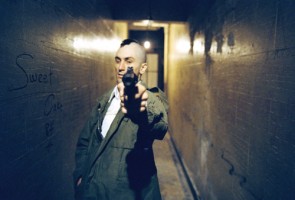“All my life needed was a sense of someplace to go. I don’t believe that one should devote his life to morbid self-attention. I believe that someone should become a person like other people,” journals 26-year-old Travis Bickle, a friendless cabbie who spends his nights driving his taxi through the filthy, steamy, dodgy streets of New York City and his days simply trying to relate to people.

COURTESY OF COLUMBIA PICTURES CORPORATION
YOU TALKIN’ TO ME? Travis Bickle (De Niro) drives home a point.
These lines, delivered in a deadly sincere voiceover by actor Robert De Niro, are at the heart of Martin Scorsese’s Taxi Driver (1976), the pathos-driven, blood-soaked story of one night rider’s heroic quest to find a girlfriend, or, failing that, to become trigger-happy lunatic.
The film will run this Friday through Sunday at Portland State’s 5th Avenue Cinema, and I highly recommend that you sit back, relax and let it bludgeon you with its vintage ’70s badassery.
Still a profoundly unsettling experience, even 36 years after its initial release, Taxi Driver is all about how the dull-witted, socially retarded Bickle copes with the inescapable truth that he is not like other people. Fueled by self-pity and always one slice short of a loaf, Bickle comes to believe that he is “God’s lonely man” and—equipped with a .44 Magnum, a .38 Smith & Wesson and a .25 Colt—transforms himself into a lethal instrument of street justice.
Bickle is not complicated. He’s a Marine Vietnam vet who suffers from insomnia and headaches, lives alone and has apparently never enjoyed healthy relationships with women, whom he neatly classifies into virginal goddesses and degenerate whores (presumably the result of a longstanding and socially enforced abstinence).
The guy is a world-class hater. His observations on the vermin populating his life—pimps, prostitutes, junkies, phony politicians, scary blacks, unattainable women and philosopher-cabbies—are ugly and shallow. He cannot confide in anyone without making that person uncomfortable. And every day he drinks himself sane and then goes to a porno, not to get off but to yearn and feel disgusted with himself.
Taxi Driver’s plot involves nothing more or less than a series of disturbing revelations about Bickle’s capacity for violence, channeled at first through grandiose, apocalyptic affirmations like “someday a real rain will come and wash the scum off these streets,” and later through straight-up predatory bloodlust. Meanwhile, his demented inner monologue turns increasingly desperate and sinister: “Are you talkin’ to me? Are you talkin’ to me? Well, I’m the only one here,” he intones to his reflection with eerie bravado.
The poor wretch pathetically tries to date women way out of his league, including a blonde angel named Betsy (Cybill Shepherd) who works in a presidential campaign office. But these would-be courtships always end in shame and embarrassment. Bickle’s just too intense, too wounded, too aggressively needy. He misses social cues and reacts harshly and inappropriately when disappointed, which happens all too often. And when he decides to make himself the patron saint of pissed-off white-male losers, he elects to save a 12-year-old hooker named Iris (Jodie Foster) from her flamboyant pimp, Sport (Harvey Keitel). Gory hijinks ensue.
I’ve probably made Taxi Driver sound like a trashy exploitation picture. But dude, this is Scorsese, arguably the greatest living American filmmaker, and he handles this unseemly material with voyeuristic focus that is lovely and terrifying. As in Raging Bull (1980), Scorsese and De Niro magically mutate this profusion of depravity, suffering and machismo into a most mesmerizing performance art.
Now that I think about it, Taxi Driver makes for an excellent companion piece to Raging Bull, another best-Scorsese-film-of-its-decade about an emotionally deranged sinner-saint with an immature attitude toward women, and whose insecurities and guilt complex (is now a good time to mention that Scorsese once considered a career as a Catholic priest?) are released through face-to-face savagery.
Alfred Hitchcock famously observed that action is when there’s a bomb under a table and it explodes, while suspense is when there’s a bomb under the table and it doesn’t explode. Taxi Driver builds its uncanny tension because Bickle, before he finally leaps off the deep end, is played by De Niro, brilliantly, as a live round of angst and alienation, always a hair-trigger away from a total nuclear meltdown.
Scorsese manages to keep the tension going, from his iconic opening shot of a sickly yellow taxi hurtling through an opaque fog of auto exhaust to De Niro’s theatrical catharsis of carnage. And notice how Bernard Herrmann’s score slowly shifts from a swooning sax-heavy lullaby to a military march as Bickle arms himself for his one-man back-alley blitzkrieg.
There is much mystery surrounding Bickle. What’s his history? Where did he get that ghastly scar on his back? Why does he shave his head before going into battle? When does building up an arsenal and going vigilante begin to seem like a good idea? And what does he hope to accomplish by martyring himself?
Wisely, Scorsese and screenwriter Paul Schrader never answer these questions, and the film is all the more intriguing for it. Too many films about psychopaths try to supply cheap Freudian diagnoses, and to explain away Bickle’s madness in this manner would only diminish the character.
We know all that we need to know. Bickle is self-absorbed but not self-aware. He is frequently and easily let down. He is condemned to live in a world that does not see him as he wants to be seen, nor love him as he wants to be loved. He is a walking raw nerve, an emotional third-degree burn victim, filled with anger and always fingering his grievances like prayer beads. And he is driven by a loneliness and narcissism that make him deeply dangerous. Enough said.

